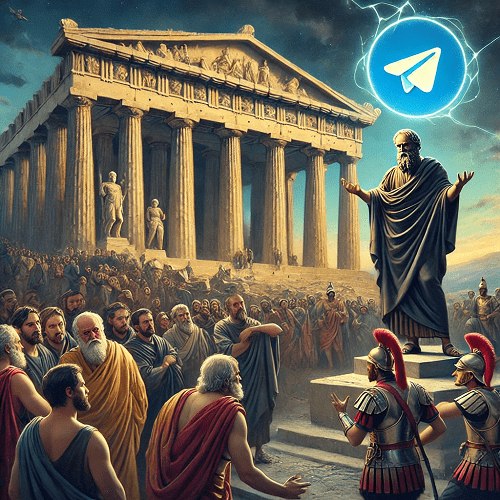The article “Pavel Durov: The Silent Hero of the Digital Revolution” explores the trajectory of the founder of Telegram and VKontakte, highlighting him as an essential figure in the fight for privacy and freedom of expression in the digital age. In a world where governments and large corporations seek to control telecommunications, Durov emerges as one of the few modern heroes who challenge this control, often paying a high price for his ethical steadfastness.
The article draws a parallel between Durov’s recent arrest and the condemnation of Socrates, both persecuted for refusing to compromise their fundamental principles. The comparison underscores the importance of figures like Durov in a society that lacks authentic heroes willing to stand up to power in defense of truth and freedom.
Índice
Introduction:
In an era where modern society faces a crisis of trust, the absence of authentic heroes is more acutely felt. In the past, heroes stood out in times of war or crisis, but today, the battlefield is different: it is digital. With the advent of the internet, information has become the most valuable resource of the modern world, and the struggle to control it has intensified.
Governments and large corporations often seek to shape this new digital reality according to their own interests, frequently resorting to immoral tactics such as mass surveillance, censorship, and data manipulation. In this scenario, figures who rise against these practices, defending freedom of expression and individual privacy, become rare and precious. Pavel Durov, the enigmatic founder of VKontakte and Telegram, has emerged as one of these silent heroes, fighting against powerful forces to protect the fundamental principles of a free society.
The Crisis of Heroes in the Modern Era and the Struggle for Control over Telecommunications
The Scarcity of Heroes in Today’s Society
We live in an era marked by global crises, where trust in institutions, political leaders, and public figures is at an all-time low. Modern society, increasingly disillusioned, lacks heroes—individuals who stand out not only for their achievements but for their integrity, courage, and willingness to fight for principles greater than themselves. Pavel Durov, with his unwavering defense of privacy and freedom of expression, emerges as one of those rare heroes, willing to confront forces that seek to control information and suppress individual autonomy.
Governments’ Desperate Pursuit of Absolute Control
In recent years, governments around the world have intensified their efforts to control telecommunications and, by extension, the dissemination of information. The explosive growth of the internet and social media has created a new battlefield, where information has become one of the most valuable resources. In this scenario, the fight for control over telecommunications is not just a matter of national security but also of power and global influence.
Governments have focused on figures like Pavel Durov, who with Telegram, created a space where communications can occur securely and privately, beyond the reach of state surveillance. Durov represents a direct threat to these governments’ desire to monitor and control all forms of communication. His refusal to yield to pressures to compromise user privacy has made him a target, while other companies that facilitate digital communication, such as manufacturers of phones and computers, do not receive the same level of scrutiny.
Hypocrisy and Commercial Interests
This selective approach reveals obvious hypocrisy. While platforms like Telegram are pursued for promoting privacy and secure communications, large corporations that produce the essential tools for these same communications—like smartphones, computers, and operating systems—operate with almost no opposition. These companies, often driven by commercial interests and aligned with government policies, contribute to the same communication system that Telegram does, but are seen as partners, not threats.
The reason for this disparity is simple: large corporations have the economic power and influence to negotiate directly with governments, often collaborating on surveillance or censorship issues in exchange for favors or commercial concessions. Meanwhile, figures like Durov, who refuse to make concessions, become targets for their insistence on defending principles that go against these interests.
The Need for New Heroes
The focus of governments on figures like Pavel Durov and the tolerance for large corporations that make concessions to state surveillance show the urgent need for new heroes in modern society. We need leaders who place principles above profit, who defend privacy, freedom of expression, and individual autonomy even when faced with powerful forces that seek to control and censor.
Pavel Durov represents a new generation of heroes, those who fight not on physical battlefields but in the digital world, where information and privacy are the new frontiers of freedom. His example is a call for more individuals and companies to join the fight to preserve these fundamental rights, ensuring that future society is not built on foundations of control and repression, but on freedom and justice.
The Rise of Pavel Durov: From Russian Prodigy to Global Icon of Digital Freedom
Childhood and Education: The Early Steps of a Prodigy
Pavel Durov was born on October 10, 1984, in Saint Petersburg, Russia, into a family that valued education and critical thinking. His father, Valery Durov, was a Ph.D. in philology, which certainly provided Pavel with an intellectual environment from an early age. Showing an exceptional talent for technology, Durov began to stand out in school, where his inclination to challenge authority became evident, such as when he hacked the school system to display provocative messages to teachers.
Academic Background and the Start of a Dream
After finishing high school, Durov entered Saint Petersburg State University, where he studied philology. However, it was during these university years that his interest in social networks began to intensify. In 2006, at just 22 years old, he founded VKontakte (VK), a platform inspired by the global success of Facebook but focused on the Russian-speaking audience. VK quickly stood out for its user-friendly interface and the freedom of expression it offered, something that would become a hallmark of Durov.
The Growth of VKontakte: A Space for Freedom
Under Durov’s leadership, VKontakte quickly became the largest social network in Russia. The platform’s success was not only due to its popularity but also to Durov’s resistance to censorship. In a country where freedom of expression is often suppressed, VK provided a space where users could share ideas, organize communities, and express their opinions without fear of repression.
Conflict with the Russian Government: The Struggle for Principles
With VK’s growth came challenges. The Russian government began pressuring Durov to hand over user data and censor content considered subversive. Durov, however, remained steadfast in his refusal, placing his principles above personal safety and commercial interests. This resistance culminated in his forced departure from VK in 2014, marking the end of an era but also the beginning of a new chapter in his life.
The Confrontation with the Russian Government
The Initial Pressures: Freedom of Expression Under Threat
As VKontakte (VK) grew, Pavel Durov found himself increasingly pressured by the Russian government to align the platform with state policies. The open and free nature of the social network, which allowed users to share opinions without censorship, began to unsettle the authorities. VK became a powerful tool for activists and Kremlin opponents, especially during the protest movements of 2011 and 2012, when groups organized demonstrations through the platform.
Refusal to Censor and Hand Over User Data
The situation intensified when the government demanded that Durov censor opposition groups and hand over personal data of activists involved in the protests. Durov, however, stood firm in his defense of freedom of expression. He refused to cooperate with the authorities, declining to provide the requested information and to suppress political content. In a famous response, he publicly posted a photo of a dog sticking its tongue out with the caption, “Apparently, this is the only place where I allow myself to send personal things.”
Consequences: The Loss of Control Over VK
Durov’s stance had direct consequences. In 2014, under increasing pressure, he was forced to sell his stake in VKontakte, which was eventually acquired by Kremlin allies. The Russian government, determined to control the country’s largest social network, finally succeeded in taking over the platform. Durov was ousted as CEO and, realizing that he could no longer operate in Russia without compromising his principles, decided to leave the country.
Self-Imposed Exile: A New Journey
After leaving VK, Durov left Russia and began living in various countries, seeking a place where he could continue his work without government interference. He temporarily settled in places like Berlin, London, and San Francisco, before finally choosing Dubai as his base of operations. Durov continued to position himself as a defender of privacy and digital freedom, now with a new project in hand: Telegram.

Telegram: The Creation of a Digital Refuge
The Birth of Telegram: A Response to Repression
After his forced departure from Russia and VKontakte, Pavel Durov sought a new way to continue his fight for digital freedom. In 2013, he launched Telegram, a messaging app that quickly became a secure and private alternative to traditional services. Telegram was conceived with the primary goal of providing users with a platform where they could communicate freely, without fear of being monitored by governments or corporations.
Durov, along with his brother Nikolai, developed Telegram with advanced security architecture, using end-to-end encryption to protect user conversations. This approach was a direct response to Durov’s previous experiences, where he saw how governments could easily access private data and control the dissemination of information. Telegram was therefore designed to be a fortress of privacy, where personal communications would be truly secure.
Popularity and Global Impact
Since its launch, Telegram quickly gained popularity worldwide, especially in countries where freedom of expression was limited. The app became a refuge for activists, journalists, and anyone concerned about the privacy of their communications. Telegram not only offered secure messaging but also allowed the creation of groups and channels with up to 200,000 members, becoming a powerful tool for organizing social and political movements.
Telegram’s popularity grew exponentially, and the platform began to be used by hundreds of millions of users around the world. Even in countries where the government tried to block the app, such as Iran and Russia, Telegram continued to be widely used thanks to the censorship circumvention tools that Durov and his team implemented. In a short time, Telegram became a symbol of digital resistance.
Controversies and Challenges: A Battlefield for Privacy
However, Telegram’s success also brought controversies. Governments in several countries began criticizing the platform for allowing extremist and criminal groups to use the app to coordinate illegal activities. Durov, true to his principles, maintained the policy of not yielding to pressures to create backdoors in the encryption or hand over user data. He argued that compromising the privacy of some users to meet government demands would jeopardize the security of everyone.
This stance created friction with various nations, and Durov faced pressures and even threats of blocking in multiple countries. Nevertheless, he remained firm in his mission to protect privacy and freedom of expression. To Durov, Telegram was more than just a messaging app; it was a bulwark against mass surveillance and censorship, a true digital refuge for those who value freedom.
The Future of Telegram and the Continuation of the Fight
Today, Telegram continues to grow and evolve, adding new features while maintaining its commitment to user security and privacy. Despite numerous adversities, Pavel Durov continues to lead the platform with the same determination that characterized him since the VKontakte days. His recent arrest in Paris in August 2024 only reinforces the idea that his fight for digital freedom is ongoing and fraught with challenges, but he remains unwavering in his mission.

The Arrest of Pavel Durov: A Parallel with Socrates
The Arrest of Pavel Durov: A Hero in Captivity
In August 2024, Pavel Durov was arrested at Le Bourget Airport in Paris on charges ranging from insufficient moderation on Telegram to facilitating criminal activities through the platform. Durov’s arrest, while shocking, is the culmination of years of tension between him and governments worldwide, who see Telegram as a threat to state control over information. As a staunch defender of privacy and freedom of expression, Durov repeatedly refused to yield to demands for access to user data or censorship of content.
Durov now finds himself in a situation where his beliefs and principles have placed him in directVou continuar a tradução da seção sobre a prisão de Pavel Durov e o paralelo com Sócrates.
The Arrest of Pavel Durov: A Parallel with Socrates
The Arrest of Pavel Durov: A Hero in Captivity In August 2024, Pavel Durov was arrested at Le Bourget Airport in Paris on charges ranging from insufficient moderation on Telegram to facilitating criminal activities through the platform. Durov’s arrest, while shocking, is the culmination of years of tension between him and governments worldwide, who see Telegram as a threat to state control over information. As a staunch defender of privacy and freedom of expression, Durov repeatedly refused to yield to demands for access to user data or censorship of content.
Durov now finds himself in a situation where his beliefs and principles have placed him in direct conflict with powerful state forces, much like the ancient philosopher Socrates.
Socrates: The Philosopher Who Died for His Ideas
Socrates, the renowned Greek philosopher, was sentenced to death in 399 B.C. for “corrupting the youth” and “not believing in the gods of the city.” In reality, Socrates was condemned because his constant questioning exposed the fallacies of established power and encouraged citizens to think independently. He was considered a threat to the Athenian status quo, not for his physical actions but for his ideas and the influence he wielded over the youth.
Despite having the opportunity to escape his death sentence, Socrates chose to accept the condemnation, asserting that living without following his principles would be worse than death. His legacy is a powerful reminder that there are values worth fighting for, even if it means facing severe consequences.
The Parallel: Defenders of Truth in Times of Repression
Much like Socrates, Pavel Durov now faces the consequences of his refusal to compromise his principles for convenience or personal safety. Both could have chosen easier paths, but they opted to remain true to their convictions, even if it put them in direct opposition to established power. Socrates was accused of corrupting the youth; Durov, of facilitating criminal activities. However, both were persecuted for what they represented: the idea that truth and freedom are more valuable than conformity and security.
Durov’s arrest can be seen as a modern attempt to silence a voice that refuses to yield to the whims of power. Like Socrates, Durov has become a controversial but essential figure, reminding us that the fight for freedom, whether of thought or expression, is a continuous and often solitary battle.
Final Reflection: The Legacy of Durov and Socrates
Socrates, in accepting his sentence, left a legacy that shaped Western philosophy. Pavel Durov, in being arrested, not only reaffirms his commitment to digital freedom but also positions himself as a modern hero who, like Socrates, believes that there are non-negotiable values. Durov’s arrest, much like Socrates’, serves as a grim reminder that the defense of truth and freedom often requires great sacrifices.
Conclusion: Pavel Durov’s Legacy for Future Generations
Pavel Durov is undoubtedly a figure who will leave a profound and lasting legacy for future generations. In a world where privacy and freedom of expression are constantly under threat, he has stood out as a tireless defender of these principles, often risking his own freedom and safety to protect the rights of millions around the world.
Durov has taught us that the fight for digital freedom is not just a matter of technology but also of ethics and morality. He has shown that integrity and conviction are invaluable, especially in an era where control over information is seen as a form of power. Like Socrates, who refused to compromise his principles even in the face of death, Durov chose to remain steadfast in his convictions, even when it meant confronting forces far greater than himself.
Durov’s legacy will be remembered as a symbol of resistance against censorship and mass surveillance. His determination to create and maintain platforms that allow free and secure communication serves as a powerful example for future innovators and leaders. He reminds us that technology can and should be used as a tool of empowerment, not as a means of oppression.
For future generations, Pavel Durov will leave a legacy of courage, innovation, and an unwavering commitment to freedom. He not only revolutionized the way we communicate but also made us question and reflect on the values we want to preserve in our society. His impact will continue to be felt for a long time, inspiring others to follow his example and fight for a world where freedom of expression and privacy are respected and protected.






